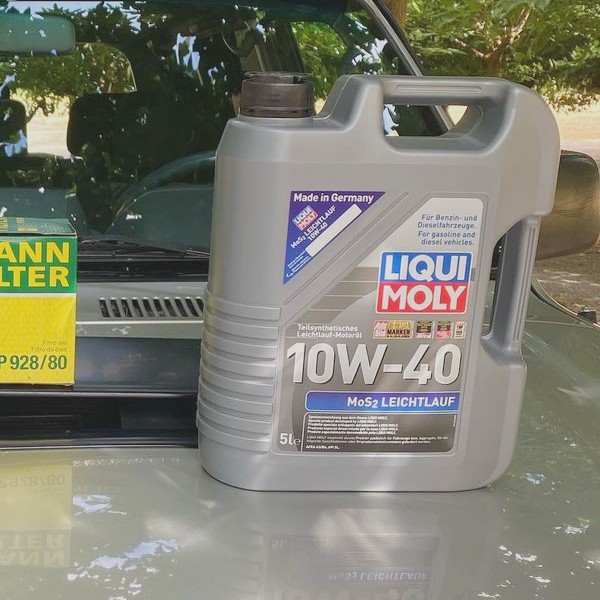Are you tired of constantly having to refill your chainsaw bar oil? Do you find yourself wondering if you can just use any old engine oil you have lying around in your garage? Well, you’re not alone!
We understand the frustration of having to constantly purchase and refill expensive chainsaw bar oil.

So, can you use 10w40 engine oil for your chainsaw bar oil? Yes, but not in every situation. Factors such as climate, bar length, and frequency of use all play a role in determining which type of oil is best suited for your needs.
Specifically designed to lubricate the chain and bar while reducing friction and heat buildup. Choosing the right oil for your chainsaw bar can be overwhelming, with so many different options available on the market.
Not only does it ensure the longevity of their equipment, but it also ensures their safety while using it. So let’s dive in to see where 10w40 can be used and where you should avoid it.
What is 10W40?

It is a type of multigrade motor oil that is commonly used in modern engines. Let’s break it down. First, let’s talk about motor oil viscosity. Viscosity refers to a fluid’s resistance to flow, or how thick or thin it is.
Motor oil viscosity is measured using two numbers, separated by a “w” – for example, 10w40. The first number, in this case, 10, refers to the oil’s viscosity at low temperatures.
The “w” stands for winter, indicating that this number is specifically measured at cold temperatures. The lower the number, the thinner the oil is at low temperatures, which allows it to flow more easily through the engine when starting up.
The second number, 40, refers to the oil’s viscosity at high temperatures. High numbers indicate thicker oil at high temperatures, which maintains its lubricating properties under the heat and pressure of the engine.
What is chainsaw bar oil?
Chainsaw bar oil is a special type of oil that is specifically designed for use with chainsaws. Chainsaw chains and bars are lubricated with this fluid to reduce friction and wear and tear. Overheating is primarily prevented by chainsaw bar oil.
The chain can become dull when exposed to excessive heat, and the bar can also be damaged. The oil acts as a coolant, reducing the heat generated by the chain as it cuts through wood.
In addition to cooling the chainsaw, bar oil also helps to keep the chain and bar lubricated. It reduces friction and wear, extending the chainsaw’s life.
Chainsaw bar oil is typically petroleum-based, although there are also synthetic options available. Some chainsaw manufacturers recommend specific types of bar oil, so it is important to check the owner’s manual to determine the recommended type for your particular chainsaw.
Is 10w40 oil suitable for chainsaw bars?
Yes, but with some caveats. Firstly, it’s important to note that 10w40 oil is not specifically designed for use with chainsaws.
This type of oil is typically used in automotive engines and is designed to provide good performance in a wide range of temperatures. However, some chainsaw owners have reported good results when using 10w40 oil on their bars.
The main advantage of using 10w40 oil on your chainsaw bar is that it is readily available and relatively inexpensive compared to other types of chainsaw oil.
This can be particularly useful if you are on a tight budget or are unable to find a specialist chainsaw oil in your local area.
But there are a few things that you need to be aware of before you start using it. In cold weather, 10w40 oil can cause problems.
When the temperature drops below freezing, the oil can thicken up and become too viscous to properly lubricate your chainsaw bar. This can put a strain on your chainsaw, and may even cause it to malfunction.
What are the problems faced while using 10w40 as a Chainsaw bar oil?
Along with advantages, there are some issues associated with 10w40, especially during winter. Here are some of the issues you may face when lubricating chainsaw bars with 10w40.
1. Increased stickiness when heat up
Using 10w40 as a chainsaw oil bar can pose a problem regarding increased stickiness when heat up. This can lead to a variety of issues that can compromise the efficiency and effectiveness of your chainsaw.
When the oil becomes more viscous and sticky as a result of increased heat, it can cause the oil to adhere to specific locations.
The viscosity of the bar oil should be lower throughout the winter to maintain the chainsaw’s lubrication.
Instead of lubricating the chain, the oil can cause the chain to become sticky and immobile. This can lead to damage to the chainsaw and chain components and ultimately affect the performance of the tool.
One of the key problems with increased stickiness, when heated up, is that it can cause the chain to become jammed. When the chain is stuck, it can be difficult to restart the chainsaw or continue to use it effectively.
A malfunctioning chainsaw can be frustrating, and it can also pose safety risks.
Another issue with increased stickiness is that it can cause the chainsaw to run less efficiently. When the chain is not properly lubricated, it can cause the engine to work harder than it needs to. This can result in increased fuel consumption, which can be costly in the long run.
Increased stickiness can also cause the chainsaw to wear out faster than it should. When the chain is not lubricated correctly, it can cause the chain to become dull and lose its sharpness.
A chainsaw may have difficulty cutting through wood as a result, which can affect its performance.
2. Chain dryness
Chain dryness is a common problem among 10w40 oil bars users. This problem occurs when the oil in the bar thickens and becomes too sticky, making it difficult for the oil to move and lubricate the chain.
When the oil cannot reach every section of the chain due to its increased thickness, the chain becomes more prone to wear and tear, leading to friction and dryness. The viscosity of 10w40 oil significantly rises in the winter, causing it to become sticky and thick.
This is because the oil’s thickness greatly grows, making it difficult for the oil to move freely. When the oil is unable to get to every section of the chain, the chain is not lubricated properly, leading to dryness and friction.
Furthermore, the lack of proper lubrication can cause the chain to become extremely dry, increasing friction even further. This can harm the chain, making it less effective and reducing its lifespan.
3. Performance drop
Chainsaws are powered by engines or motors that use oil as a lubricant to reduce friction and wear between moving parts. However, when the chainsaw oil is thick and sticky, it can cause more friction, leading to a decline in performance.
As the chainsaw is used over time, the increased friction eventually causes the engine or motor to fail to function correctly.
Using a chainsaw can cause this to occur at any time, which can be dangerous. Therefore, it is essential to confirm the root cause of the performance decline to avoid any accidents.
4. Tacky properties and Spreading
10w40 oil contains tacky properties, which is why it is not suitable for use as a bar oil. While this can be beneficial in certain situations, it can also lead to a reduction in oil throw-off.
This means that the oil will not be able to effectively lubricate the chain and gear teeth, which can deteriorate over time.
Using 10w40 oil also spreads more than other types of bar oil. In confined spaces or areas where you need to be careful about oil spreading onto other surfaces, this can be a problem.
Can you use used motor oil for the chainsaw bar?
Yes, it can be used, but it is not recommended due to several reasons. Used motor oil is the oil that is drained out of a car or truck during an oil change. This oil is black and gritty because it contains impurities, such as dirt, metal flakes, and other contaminants.
These impurities can be abrasive and damaging to the chainsaw bar and chain. The chainsaw bar and chain need lubrication to operate smoothly, and using abrasive oil can cause unnecessary wear and tear, leading to a shorter lifespan of the chainsaw.
Oil oxidized, contaminates, and degrades the additives over time. Therefore, worn motor oil does not offer the same level of protection as the new oil, and it can also clog pipes and create friction.
Additionally, used motor oil is runny and splatters easily. This makes it messy to use and can create a safety hazard, especially when working with a chainsaw. The splatter can also make it challenging to clean up, which can be an annoyance to mechanics.
It is also possible to harm the environment by using used motor oil. To prevent pollution of the environment, used motor oil should be disposed of properly. The oil can harm the environment if it is used as bar and chain oil.
It is better to use a bar and chain oil designed specifically for chainsaws. This oil is less abrasive and more effective at lubricating the chainsaw bar and chain. It is also less messy and easier to clean up.
Bar and chain oil is readily available at hardware stores, home centers, and online retailers, making it easy to find and purchase.
What is the difference between 10w40 motor oil and Chainsaw Bar oil?
The usability of 10w40 motor oil and its drawbacks while using it instead of Chainsaw bar oil are seen.
While they both are used for lubrication, they have distinct differences that make them suitable for specific purposes. Here are the main differences between 10W40 and chainsaw bar oil
1. Thickness
One of the primary differences between chainsaw bar oil and 10W40 motor oil is their viscosity. Chainsaw bar oil is thicker than motor oil, which is necessary to provide the extra lubrication needed for the chainsaw’s bar and chain.
The chainsaw bar oil is designed to stick to the chain and bar to reduce friction and prevent wear and tear on the machine.
2. Biodegradable
Motor oil is also non-biodegradable, so it doesn’t break down easily in the environment, which makes it a significant difference from chainsaw bar oil.
Vegetable oils make up chainsaw bar oil, which is biodegradable. It’s essential to use the proper oil for the machine to ensure it lasts longer and doesn’t cause any harm to the environment.
3. Tackifiers
Tackifiers are additives that help the oil cling to the metal surface, forming a protective layer. Chainsaw bar oil contains tackifiers that help it adhere to the chainsaw’s bar and chain, preventing it from flying off the metal surface.
Due to the absence of tackifiers in 10W40 motor oil, it won’t stick to the metal surface, causing increased wear and tear.
FAQs
Can I mix chainsaw bar oil and motor oil?
It is not recommended to mix 10w40 oil with chainsaw bar oil. Mixing oils with different properties can affect their effectiveness and could result in damage to your chainsaw. It’s best to use only the type of oil recommended by the manufacturer.
Can I use vegetable oil as a substitute for chainsaw bar oil?
Vegetable oil is not recommended as a substitute for chainsaw bar oil. While it may provide some lubrication, it is not designed to withstand the high temperatures and pressures generated by a chainsaw. Vegetable oil can also become rancid over time, which could cause your chainsaw to malfunction.
What should I do if I accidentally use the wrong type of oil for my chainsaw bar?
If you mistakenly use the wrong kind of oil on your chainsaw, you should immediately stop using it and drain the oil. Then, refill the chainsaw with the correct type of oil and test it to make sure it is operating properly. If you notice any issues, you should take your chainsaw to a professional for inspection and repair.

I am Senior Editor and CEO and I have been a chainsaw enthusiast for over 12 years. As a passionate chainsaw enthusiast, I have got a wealth of knowledge and experience with chainsaws, and I am constantly striving to expand my expertise and knowledge. Read More!
